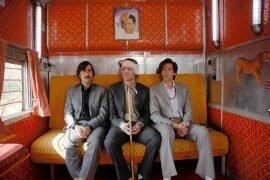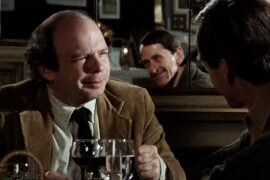Cannes film festival triumph and critics favourite, “Wong Kar Wai” finds its way to the heart of every spectator. It has always been and remains. BFJ takes a look at the master’s trilogy consisting of films “Days of Being Wild”, “In the Mood for Love” and “2046” and go deeper into Kar Wai magic.
The Kar Wai trilogy is a journey through time, life, history and shades of love. In his early creation – “Days of Being Wild” – the director appeals to youth, i.e. the very time when the need for love is sharp and natural as ever.
The main character, Yuddy, is a young guy met by spectators either in a small eatery or in the store. A can of Coke is a reason for acquaintance. It’s so ironic in such a chamber room with greenish-blue walls, among the poor decor. The first thing that catches the eye is color. Bottle-green-blue is a palette of “Days of Being Wild”. Its shades spill everywhere – in the opening credits, in landscapes, even in the heroes face to which so much attention is paid. Color of something that’s departed forever, color of quiet pain and calmness. It presents in the character’s eyes that has its reason.
Love is an uncompromised sensation; “Tonight you’ll see me in your dream,” – the hero tells Su Li-zhen. A few days later, he doesn’t give her a chance by penetrating into her thoughts and memories with just one minute on a clock: “At one minute before 3pm on April the 16th, 1960, you’re together with me. Because of you, I’ll remember that one minute. From now on, we’re friends for one minute. Thisisafact, youcan’tdeny. It’sdone.” Moments of charm and interest are important for the relationship. Besides the character of Kar Wai is mostly lazy (the author called his hero “a fei” i.e. “dude” in Chinese) there is some attraction and magic in Yuddy. In his words and discourse, in the process of seduction (e.g. one earring that’s given as gift to Leung Fung-ying).

Yuddydoesn’tlivebutsoarbycharmingonegirloranother. But he’s never tied to any of them (he forces Li-zhen get away from him rejecting her family’s wishes). He’s like those bird without legs which just “fly and fly. And when it gets tired it sleeps on the wind. This bird can only land once in its whole life.” But what is flying if not love, or attempt to find it? Nevertheless the lover’s love is not one he wants to find (the film’s original title is “A Fei jingjyuhn” or “ The True Story of a Dude”).
Growing up at the hands of adoptive parents he longs to find his real parents that left him in his infancy, and he goes to any length to have the true love of his mother. However, not everyone’s desires are meant to come true, and not all of the feelings are mutual. Mother rejects him and doesn’t give him a chance (ironically he acts the same with his lovers, a perfect example of upbringing’s impact on behavior and fate). But after such a devastating experience no one can go back to a normal life, and Yuddy disappears somewhere in the Philippines.
Rain in Kai Wai’s world is a pain pelting from the heavens. Often unobtrusive, echoing frozen heroes faces, it seems to be unconscious hint about what happened. Li-zhen stays outside in the rain, alone with her rejected feelings and hopes. There’s Yuddy’s friend, Zeb, who realises the futility of his efforts to achieve Mimi’s recognition (their dialogue on a deserted street near the car, and their subsequent decision of selling it). But under this rain the spectator understands that Kai Wai’s characters could be anyone, but they are always noble. They fight for their feelings and happiness: Mimi goes for her lover in another country, and Tide remembers the girl he left behind the seas and her broken heart.
“I used to think there was a kind of bird that, once born, would keep flying until death. The fact is that the bird hasn’t gone anywhere. It was dead from the beginning.” Yuddy may indeed be dead from the very beginning, affectionless of his mother that left an imprint on his fate. But he is also a romantic who caught a moment of the very real feeling of love, that he realised too late. He learned, “whom he loved more than anyone else until the end of his life” and left this moment forever in my memory as true love forever remains with us.
And while Kar Wai doesn’t find a place for happy endings in his films (maybe this bird is a happiness that always eludes the grasp?) he leaves us with hope. In “Days of Being Wild” they are ringing phones in the night, the melody of Xavier Cugat’s “Perfidia” and Tony Leung’s character from which no one is able to tear their eyes away. All these lead the spectator to the next Maitre masterpiece “In the Mood for Love” but yet the captions time has been: “What would you like to see at the end of your life? It is not that long. It’s time to think about it. “





